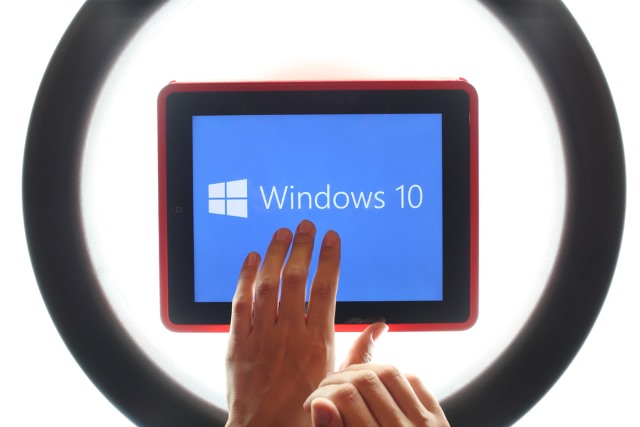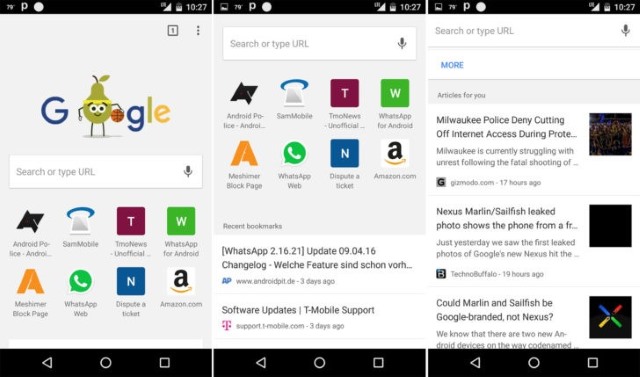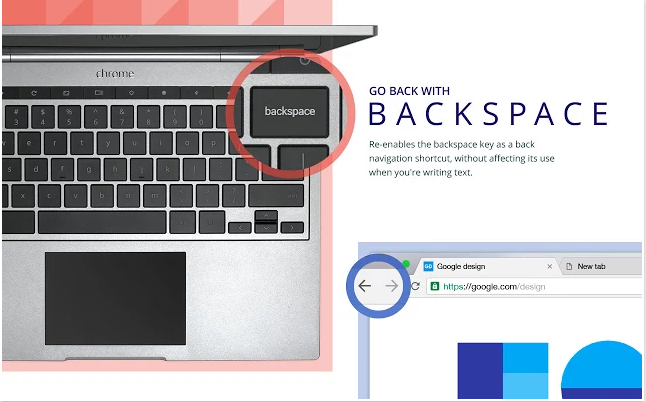
Google shows off improved battery life with Chrome 53
Chrome has long been held up as an example of software being battery hungry. It's something that Google has been working to address with the Android version of the browser; now the company has turned its attention to the desktop build.
In a new video that highlights the improvements that have been made in recent months, Google compares a Vimeo video running in Chrome 46 to the same video running in Chrome 53 on identical hardware -- a Microsoft Surface Book, since you ask. The results are impressive.

Instantly hide Chrome tabs with Panic Button
There are plenty of legitimate reasons why you might want to prevent others snooping on your web activities, and technologies like Chrome’s "incognito mode" can help maintain your browsing privacy.
These high-tech solutions still leave you with some very low-tech vulnerabilities, though, in particular others getting a glimpse of what you’re doing as they walk past.

Changes to Microsoft Family make it possible to block Chrome and Firefox in Windows 10 Anniversary Update
Windows 10 Anniversary Update introduced a number of changes to the operating system, and Microsoft has started to email users about changes to Microsoft family settings. As the name implies, this is about keeping things family-safe, family-friendly, but one of the changes is unlikely to go down well with rivals.
While new Microsoft family options make it easier to place limits on what children are able to do with a computer, a controversial option forces the use of Internet Explorer or Microsoft Edge. Microsoft has made it possible to block the use of Chrome, Firefox and other rival browsers.

Chrome apps to disappear from Windows, Mac and Linux while Chrome OS gains new launcher icon
Google has come to the realization that hardly anyone is using Chrome apps. As such, the company plans to phase out support for the apps on Windows, Mac and Linux over the next couple of years.
While admitting that packaged apps are used by just 1 percent of users of the three platforms, Google says that the decision comes after a drive to integrate the feature of apps into web standards. Chrome apps will live on in Chrome OS "for the foreseeable future", but a wind-down timetable has been set out for everyone else.

Chrome for Android is gaining a Google Now-driven New Tab page
If you're working with bleeding edge Chrome for Android, you can experiment with an updated version of the New Tab page. Anyone with Chrome Dev or Beta installed can toggle a settings flag to bring extra content to new tabs.
The updated New Tab page features -- in addition to your most frequently visited sites and a list of recent bookmarks -- a collection of suggested news stories, similar to those found on Google Now cards.

Google restores backspace functionality to Chrome, but there is a catch
It may seem logical that, when browsing, the backspace key would work to take you back to a previous web page. However, that isn't the case with Google Chrome. Although this was an option in the browser previously, Google chose to remove it.
The company has seen the light now however, and is bringing the feature back, no pun intended, although it isn't changing the browser's default behavior.

Google will block Flash in Chrome 53
Following the lead of Apple with Safari in macOS Sierra, and Mozilla with Firefox, Google has announced that Chrome will begin to block Flash content. Starting with Chrome 53 in September, Google will "de-emphasize Flash in favor of HTML5".
Google says that the decision has been made to improve security, performance, and battery life, and it builds on an earlier change that made some Flash content click-to-play rather than loading it by default.

New browser management suite helps businesses improve security and cut costs
The move to software-as-a-service models has meant that the humble browser is now the key endpoint software for many enterprises.
Yet this reliance on browsers can make it hard for IT teams to exercise the levels of control they need. Browser management specialist Browsium is launching a new version of its management suite to give administrators the right tools to improve security and reduce costs.

Chrome 52 for Android massively reduces battery and data consumption by video
Google is pushing out Chrome 52 for Android, and the big news with this release relates to video. With video being such a massive component of internet traffic, it is perfectly natural for Google to focus on this area, and the company says that improvements have been made to battery consumption and loading times.
There is a marked shift of focus to speed and power efficiency -- compared to the desktop where the focus has long been quality over everything else.
Firefox 48 FINAL improves download protection as part of wider security crackdown
Mozilla has unveiled Firefox 48 FINAL for desktop. After the relatively minor releases of late, Firefox 48 contains a number of notable new features, both visible and behind the scenes, to excite users.
There’s improved protection against potentially malicious downloads, the requirement for add-ons to be both verified and signed by Mozilla before they will load, and a number of WebRTC enhancements -- and that’s just for starters.

Check internet speed and web page download times with Speedtest for Chrome
Speedtest is a free Chrome extension which allows testing your internet connection speeds and web page download time. It gives you access to the core of the Speedtest.net website in a click or two, wherever you are on the web.
Click Speedtest’s icon at any time and a panel appears. By default this displays the name of the currently displayed page, and the time it took to load.

How you might get hacked by a Chrome extension
Malware isn’t just about native executables or rogue apps, not any more -- a malicious browser extension can cause almost as many problems on all your devices at once.
With the right permissions, for example, your new Chrome add-on could steal your user credentials, post as you on social media, read your emails, help launch a DDoS attack, and more.

Create stylish coding snapshots with Marmoset
You’re building a website, presentation, maybe a CV listing your many coding skills, and would like some kind of graphic to illustrate that section. But what should it be?
Forget the usual clipart, install the Chrome app Marmoset instead, and it’ll help you create a stylish presentation-ready code snapshot in seconds.

Mozilla will block non-essential Flash in Firefox from next month
Flash is seen, quite rightly, as the scourge of the internet, and for some time there has been a vocal movement to eradicate all traces of it. Following the lead of Google Chrome and upcoming versions of Safari, Mozilla is taking the step of blocking Flash content from Firefox that is "not essential to the user experience".
It's part of the company's drive to reduce reliance on Flash, whilst recognizing that there is still a need to provide a degree of support for "legacy Flash content". Mozilla has taken the decision to ditch Flash in a bid to improve browser performance, boost security and improve battery life on mobile devices.
Microsoft badmouths Chrome's battery life as Windows 10 message urges switching to Edge
Microsoft has been shouting about Edge a lot as of late. Not happy with claiming that it is the most battery-friendly of the main web browsers, the company has also made much of Edge's 1080p support for Netflix.
In the latest twist, Microsoft switches tack, instead using pop up messages in Windows 10 to badmouth Chrome and promote Edge. The pop up rams home the idea that Chrome is a battery hog and suggests switching to Microsoft Edge to increase longevity.
